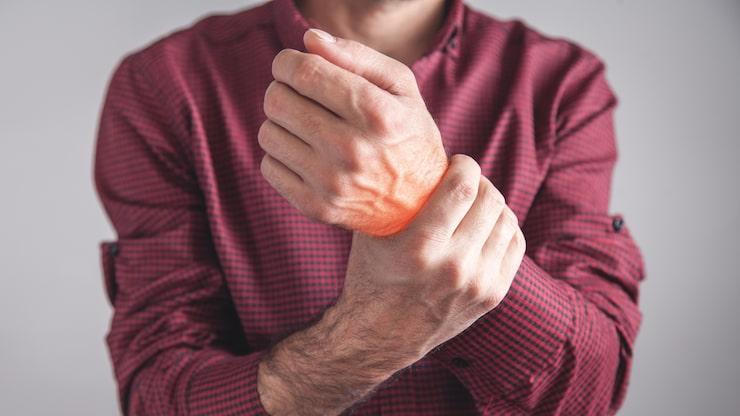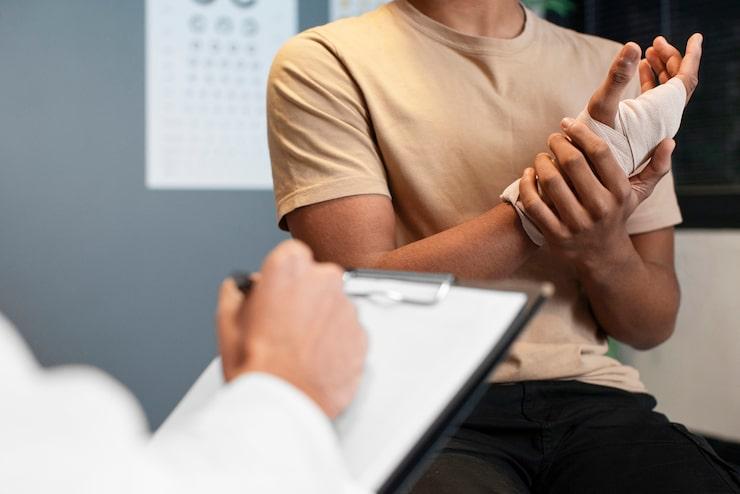
person feeling pain due to nerve injury
Nerves are vitally crucial for everything the body does, feels, and reacts to. They carry messages between the brain, spinal cord, and the rest of the body, which helps us think, move, and do everyday tasks. When a nerve becomes damaged, various ways of sending messages stop working, which can make you feel pain, weakness, numbness, or even lose function.
We at Prakash Hospital in Noida understand how hard it may be to deal with nerve injuries. Our specialists can accurately evaluate and treat nerve damage caused by trauma, surgery, or other issues to restore nerve health and function.
This blog will teach you about nerve injuries, such as what they are, the many types, the symptoms, the causes, the treatment options, and when to see a doctor.
Electrical impulses can't get through when one or more nerves are damaged, stretched, squashed, or cut. This is what happens when a nerve gets hurt. The damage could be temporary or permanent, depending on how severe it is.
There are three main types of nerves in the body:
British neurosurgeon Sir Herbert Seddon divided nerve injury into three main groups:
1. Neurapraxia (Mild Injury): The nerve is stretched or compressed, but its structure stays the same.
A little injury or pressure often causes it.
You may feel weak, numb, or tingly for a short while, but it will go away in a few days to a few weeks.
2. Axonotmesis (Moderate Injury)
The axons, which are the nerve fibers, are injured, but the tissue around them is still healthy.
You can get well; however, it can take a few months because the nerve grows back slowly.
3. Neurotmesis (A Very Bad Injury)
The nerve is completely cut or broken
Spontaneous recovery is uncommon and often requires surgery to cure.
At Prakash Hospital, our neurologists and surgeons employ clinical and imaging tests to determine how severe the injury is and what the best way to treat it is.

person feeling pain due to nerve injury
There are a lot of things that might hurt nerves, from everyday accidents to more serious medical conditions. Some common explanations are:
1. Physical harm
After an accident, a fracture, or a cut, swelling and pressure can harm nerves directly or indirectly.
Injuries from stretching or compressing are prevalent after falls and sports injuries.
2. Medical procedures or surgery
Nerves can be injured by accident during surgery, especially near joints or critical organs.
It can harm the nerve if the drug is injected too close to it.
3. Compression or trapping
Long-term strain on nerves can lead to carpal tunnel syndrome, sciatica, or cubital tunnel syndrome.
4. Moving the same way again and over again
Putting too much tension on specific muscles or joints all the time could make the nerves next to them painful and swollen.
5. Problems with health
Diabetes, autoimmune disorders, and infections are among the conditions that can lead to nerve inflammation or degeneration.
6. Radiation or chemotherapy
Some cancer treatments might harm nerve fibers, which can lead to neuropathy.
There are various things that make it more probable for nerve injury to happen:
Our team of experts at Prakash Hospital in Noida looks at these risk factors before making suggestions for preventive or corrective activities.
The symptoms depend on what kind of nerve is injured (motor, sensory, or autonomic) and how extensive the damage is. Some common signs are:
1. Symptoms that damage the senses
Feeling numb or tingling (like pins and needles)
Not being able to feel pain, touch, or temperature.
Pain that feels like a shock or a burn
2. Signs of Motor Function
Muscle weakness or paralysis
Issues with balance or coordination
Muscle twitching or wasting (atrophy)
3. Signs of the autonomic nervous system
Changes in how much you sweat or how effectively you can keep your body temperature in check
Blood pressure or heart rate that is not normal
Digestion or bladder problems
4. Changes in the body that are simple to see
Changes in the color of the skin around the injury, swelling, or bruising
Loss of reflexes in the affected regions.
If you feel weak, numb, or in pain after an injury or surgery, you should visit a doctor right away. This will help keep nerve damage from getting worse.
Our doctors at Prakash Hospital use both clinical examinations and more advanced tests to figure out exactly where the nerve damage is and how bad it is.
1. An examination of the body and the brain
Checking how strong muscles are, how quickly they respond, and how sensitive they are.
2. Electromyography (EMG) looks at the electrical activity in muscles to identify whether there is an issue with the nerves.
3. Nerve Conduction Studies (NCS) check how fast and well electrical signals go across the nerves.
4. Tests that take photos
MRI and ultrasonography can detect inflammation, nerve compression, or tears.
CT scans can help locate broken bones that are putting pressure on nerves.
5. Blood tests
To rule out metabolic or autoimmune causes, such as diabetes or a lack of vitamins

doctor helping patient for nerve injury
How the injury is treated will depend on what kind it is and how bad it is. The goal is to get rid of the symptoms, restore the body to normal, and prevent more damage from happening.
1. A way to treat that doesn't need surgery
For injuries that aren't very bad, such as neurapraxia or compression:
Not moving and resting: Reduces the stress on the nerve that is hurt.
Physiotherapy helps you get your strength, movement, and coordination back.
Pain management: using pharmaceuticals such as anti-inflammatory agents, anticonvulsants (for nerve pain), or muscle relaxants.
Vitamin B tablets help nerves heal.
Cold and heat therapy: It helps blood flow and reduces edema.
2. Help from a doctor
Corticosteroid injections are used to reduce swelling in nerves that are being compressed.
Nerve blocks: They help with pain for a little while.
Electrical nerve stimulation helps muscles and nerves heal and do their jobs.
3. Surgery
If you have severe or complete nerve injury (neurotmesis), you may need surgery.
Some common things to do are:
Repairing nerves (neurorrhaphy): Putting together nerves that have been severed
Using a nerve from a donor to connect two ends that are broken is called nerve grafting.
Nerve decompression is the process of freeing up nerves that are trapped, like in carpal tunnel surgery.
Tendon transfer: If the nerves can't be repaired, the tendons can be moved to fix the problem.
Our orthopedic surgeons, neurosurgeons, and rehabilitation specialists all work together at Prakash Hospital in Noida to make sure that surgeries go as smoothly as possible and that patients heal as rapidly as possible.
How long it takes to heal depends on how bad the damage is and how it is treated. Some nerve injuries heal in a few weeks, but others that are worse may take months or even longer.
Rehabilitation therapy is very crucial for getting better:
Physiotherapy keeps muscles from getting tight and makes them stronger.
People can perform things on their own again with the support of occupational therapy
Electrostimulation: Helps muscles and nerves perform while they heal.
At Prakash Hospital, our physiotherapists design therapy plans that are different for each patient. These plans help them recover their strength, feeling, and confidence.
You could end up with the following if you don't pay attention to nerve injury symptoms: Weakness or paralysis that lasts forever
Not all nerve injuries can be avoided, however, there are certain things you can do to minimize the risk:
At Prakash Hospital, we are experts at finding and treating all forms of nerve injuries, from mild compression to severe trauma. Our place has:
Don't delay if you or someone you care about develops numbness, weakness, or nerve pain after an injury or surgery. Go to Prakash Hospital in Noida for expert care and evaluation. Getting help early can make a big difference in how soon you get better.
We offer expert care across key specialties, including Medicine, Cardiology, Orthopaedics, ENT, Gynaecology, and more—delivering trusted treatment under one roof.
Prakash Hospital Pvt. Ltd. is a 100 bedded NABH NABL accredited multispecialty hospital along with a center of trauma and orthopedics. We are in the service of society since 2001.
OUR SPECIALITIES
Contact Us
D – 12A, 12B, Sector-33, G. B. Nagar, Noida, Uttar Pradesh 201301
+91-8826000033

© 2026 All rights reserved.
Designed and Developed by Zarle Infotech